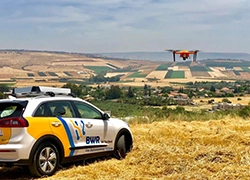
The prevalence and privacy risks of GPS signal tracking
The application of GPS has not only greatly facilitated travel and daily life, but also become a tool for enterprises to improve management and operational efficiency. For example, many companies use employees' GPS positioning to track the whereabouts of the device and then understand the work situation of employees. Today, I will introduce some methods that can be used to avoid GPS tracking: installing anti-tracking applications and GPS jammers on mobile phones, etc.
Negative impact of GPS tracking in society
- In the famous "United States v. Jones" case, the U.S. Supreme Court ruled that the government agency's installation of GPS devices on Jones' wife's car without permission violated the privacy rights stipulated in the Fourth Amendment. Although the ruling clarified the boundaries of illegal tracking, the government and law enforcement agencies can still obtain certain GPS data through legal procedures, which makes privacy protection more complicated.
- Privacy conflicts between companies and employees. Not only the government, but more and more companies are beginning to use GPS tracking technology to improve productivity. For example, in 2015, Ireland-based UPC tried to integrate GPS tracking into employees' daily work, which aroused employees' concerns about privacy leakage. Many employees worry that this tracking may eventually evolve into a means of surveillance, or even be used for over-regulation and "espionage". More and more people in Denmark are using GPS signal blocker jammers for personal location privacy.
- The popularity of GPS tracking devices and applications may also trigger hacker attacks and lead to employee personal information leakage if security measures are insufficient.

Effective methods to prevent GPS tracking
To prevent GPS signals from being abused or causing privacy leakage, individuals and companies can take some technical measures to block or disrupt GPS signals. Here are some common protective measures:
- Turn off the GPS function on the device: The easiest way is to manually turn off the GPS function on the mobile device. Most smart devices allow users to turn off the positioning function in the settings, but be aware that some applications may reactivate GPS on their own, so regular checks are required.
- Use anti-tracking applications: There are some anti-tracking applications on the market that can help users control the sharing of GPS data to ensure that only authorized applications or users can access location information.
- Use GPS blocking devices: Users with high privacy requirements can use professional GPS blockers. These small devices can emit interference signals at the same frequency as GPS, thereby blocking the device's positioning function and making it impossible for the outside world to obtain location information. Although some countries prohibit the use of such devices, GPS signal blockers are an effective protective measure when allowed.
- Check device permissions regularly: Check device permissions regularly to ensure that only necessary applications can access GPS data, and turn off or delete unnecessary permissions to help reduce unnecessary location tracking.
With the improvement of privacy awareness, the need to prevent GPS tracking is gradually increasing. In the future, smarter anti-tracking technologies may emerge, such as automatically blocking unauthorized GPS signals, or using multiple encryption methods to ensure that users' location information cannot be easily obtained. At the same time, the country may also introduce stricter laws and regulations to restrict the use of GPS data by governments and enterprises to better balance technological convenience and privacy protection.












